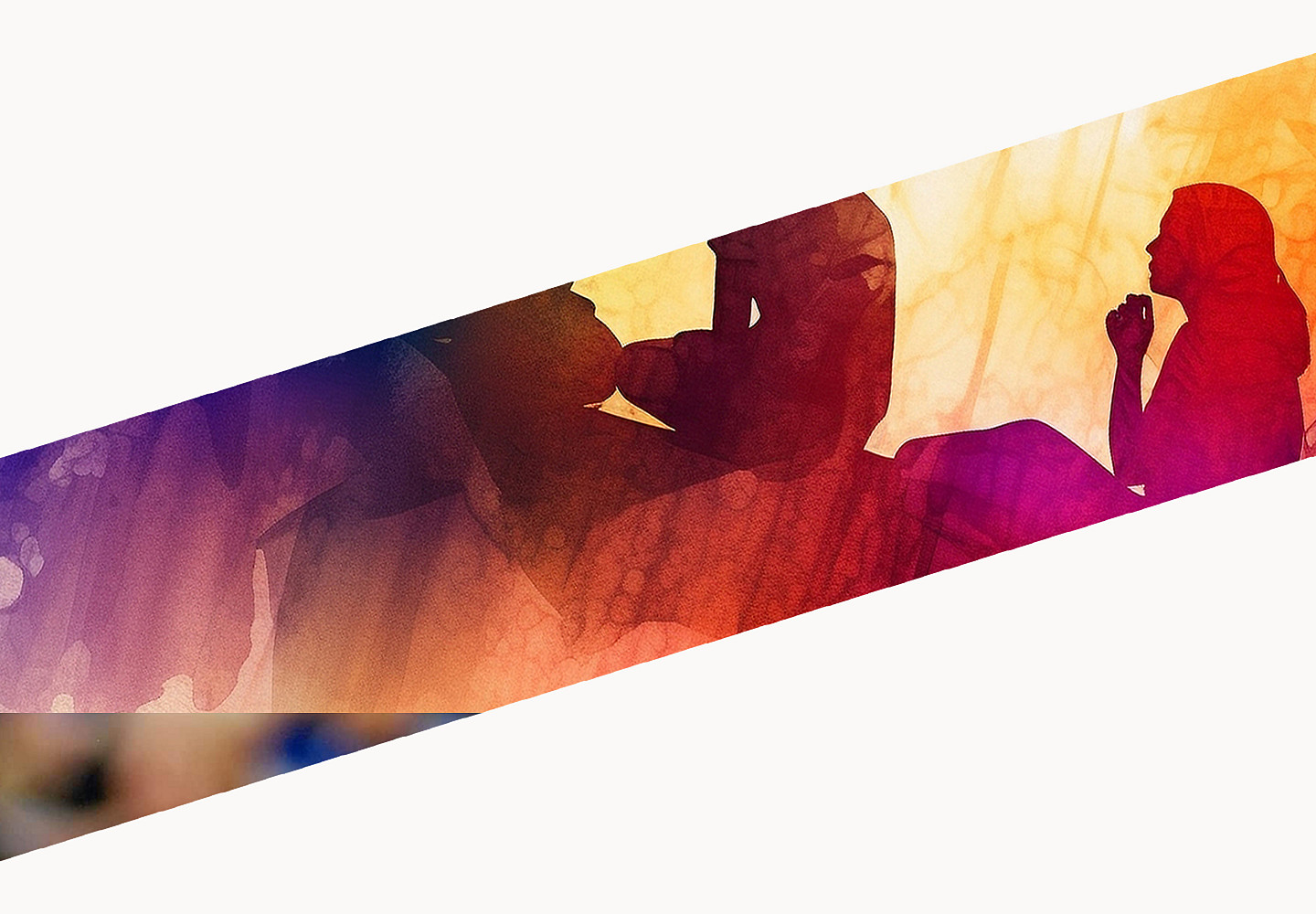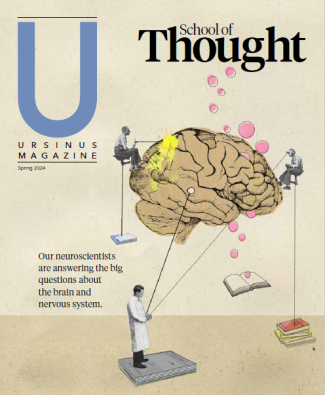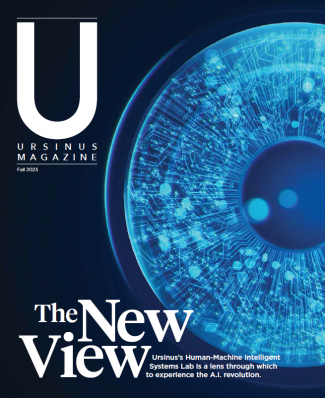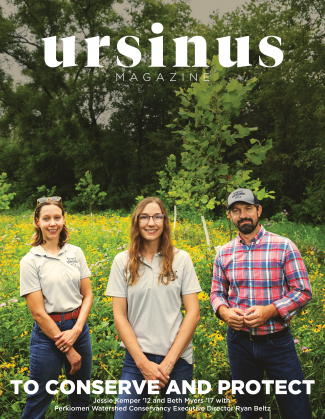Lean on Me
To conclude our three-part series on the college’s commitment, under the international Okanagan Charter, to the well-being of people, places, and planet, we are doing a deeper dive into how students serve as supporters, educators, and role models.

Last year, in “Here to Help”—our story about the creation of the Health and Wellness Division and the college’s efforts to prioritize mental-health initiatives on campus—we spotlighted some of the departments and groups that offer support to students. Now, to conclude our three-part series on the college’s commitment, under the international Okanagan Charter, to the well-being of people, places, and planet, we are doing a deeper dive into how students serve as supporters, educators, and role models.
Support takes many forms on campus. Physical spaces—and the people who staff them—such as the Institute for Student Success, the Institute for Inclusion and Equity, the office of disability and access, the wellness center, the Hive (home to the health promotion office), and the offices of residence and religious life are top of mind when it comes to support on campus.
All offer vitally important services and are the building blocks behind the “One Ursinus” pillar of the “Every Student’s Success” strategic plan. Beyond those areas lies perhaps one of the greatest sources of support: the students themselves.
Feeling heard and feeling seen can make all the difference for a person facing a hardship, and everyone interviewed for this story agreed that very often that type of support is especially meaningful when it comes from a peer.
Resident advisors are often the first point of contact for students who need help.
Joshua Odebode ’24 is a health and exercise physiology major from Toms River, N.J. He is also a member of the football team, a participant in the emerging leaders academy (ELA) for student-athletes, and a researcher in the REPS (Resistance Exercise Physiology Sports) lab. This semester, he added “resident advisor” (RA) to his resume.
It’s not common for seniors to become resident advisors, but it’s a role Odebode has been contemplating since he was a first-year student. Now in his fourth year, and bolstered by lessons learned in the ELA, he felt the time was right to make an impact.
As an RA in Paisley Hall, which is one of the dorms dedicated solely to first-year students, Odebode promotes an open-door policy to his residents. “I tell them, ‘If you ever need to talk about anything, whether it be relationships with your roommate or people back home, academics, or athletics, don’t ever be afraid to knock on my door and come talk to me because I’ll always be there. I was once in your shoes so I’m able to help and be that shoulder to lean on.’”
For Odebode, the importance of peer-supported initiatives on campus comes down to one key aspect: relatability. “When it’s student to student, we are taking the same classes, doing the same things, so we are really able to feel what they feel.”
Taking it a step further, beyond the benefits of housing for first-year students, the college’s special interest (SPINT) and affinity housing program creates space for students to live and find support in the camaraderie of a community. SPINT Housing gives students an option to reside with those who share their interests and passions (current SPINT homes are International Culture House and Writing and the Arts House). Affinity Housing offers students who self-identify within a historically marginalized population the opportunity to live together, share salient social identities, and engage in programming that explores various aspects of those identities (current affinity homes are Community of Diverse Excellence, Hillel House, and Queer House).
Similar to Odebode, Maddie Benfield ’25 wants to help her residents feel a sense of comfort and “make Ursinus College their home away from home.” As one of the RAs assigned to the college’s residential village on Main Street, she oversees residents in two homes, one of which is a SPINT house.
“SPINT and affinity housing is important for students’ sense of belonging,” said the biology and education double major from Glendora, N.J. She’s also a strong advocate for fostering collaboration with other residential areas, allowing students to support, connect with, and learn from communities they may not have otherwise encountered.
Everyone goes through things, and we all do it together. Knowing the girl sitting next to you in class is going through the same things really helps you understand that you’re not alone.
— Elisabeth Tucker ’24
In addition to RAs, each SPINT and affinity community has a program leader who facilitates activities that align with the house theme or identity. Program leaders are supported by a graduate assistant, Reese Goodlin ’23, and they tend to be upperclass students whose experiences allow them to serve as mentors for housemates.
“Affinity housing is especially important because our students from historically marginalized populations are able to live in a community together. It is these students who most often struggle to see their identities represented in other students, faculty, and staff across campus,” said Director of Residence Life Alyssa Caffarelli Murphy ’13. “If we want students from marginalized identities to feel a true sense of belonging at Ursinus, it is critical that we offer and cultivate spaces for them that celebrate their identity and help foster connection with others who share their identity.
Like many Ursinus students, Benfield wears multiple hats on campus. She is also the secretary of UC Possibilities, a club that was founded by Sophie Louis ’24, who is also president.

The group promotes accessibility for and awareness of hidden disabilities, which can be physical or mental. Members also work to reduce stigma regarding disabilities and make the campus more inclusive. The group is working to establish an accessibility committee within the Student Government Association and implement an accessibility checklist to encourage inclusivity (such as meal options for those with food allergies, sensitivities, or preferences).
A psychology major from Sykesville, Md., Louis chose Ursinus in part due to its multiple avenues of support—which have only grown due to the progress she helped initiate.
In addition to her role in UC Possibilities, Louis is also the student lead for UCrew (Ursinus Cultivating Respect, Education, and Wellness), which is a group of nationally certified peer educators who raise awareness about well-being and substance-use disorder, support those who choose sobriety, educate students on harm-reduction strategies, and create a supportive environment for everyone.
“When everyone’s looking for college, they’re looking for a supportive, inclusive community, and I think that’s the main theme for both of my groups,” said Louis. “We are trying to increase that support and inclusivity [so that] students are able to do their best in college and be set up for success.”
Elisabeth Tucker ’24 is also a member of UC Possibilities and president of yet another club that seeks to support students. The Hidden Opponent (THO) is a national nonprofit organization that focuses on mental health in athletics (although the Ursinus chapter is open to the entire Ursinus community regardless of athletic status).
A member of the gymnastics team who hails from Marlborough, Mass., Tucker says the peer-to-peer acknowledgement provided by student-run clubs helps prevent feelings of isolation.
“Everyone goes through things, and we all do it together,” said the biology major. “Knowing the girl sitting next to you in class is going through the same things really helps you understand that you’re not alone. It’s not someone you don’t know saying, ‘Oh, it gets better,’ but it’s someone you’re going to see around campus.”
Members of THO work to spread awareness about—and facilitate connections with—the resources available on campus. “We have a lot resources available on campus and not everyone knows about them.”
In addition to providing support to those who ask for it outright, Tucker has been empowered by her roles to initiate conversations when she suspects someone could use help. “What I’ve learned from THO and from my own struggles, I think I’m a little bit more in tune to those subtle changes that not everyone picks up on,” said Tucker. “I recognize someone’s changes in body language or behavior. I’m able to pull that out and go up and say, ‘Hey, do you want to grab coffee and talk?’”
That same caring approach that lets a person know they are not alone is what also drives the Peer Advocates.
Alex Bender ’24, a chemistry major from Horsham, Pa., is one of 11 Peer Advocates, a specialized group of student leaders who serve as an intermediary resource between the Title IX office and students who might be struggling with issues related to Title IX.
The group acts as an extension of resources, as well as a support system for students who want to pursue formal or informal resolutions related to Title IX. “I feel it’s also important that there are students working in this office because going to a student makes it feel like you’re going to a friend with a problem,” said Bender. “And all that person’s going to do is take [the information] … and get the resources they feel can best support you.”
“That is, however, a very small part of our role. More often than not we spend our time educating students on campus about Title IX-related issues, discrimination, sexual assault, dating violence, boundaries, and accountability.”
Each Peer Advocate lists a quote with their profile on the website. Bender’s reads, “Everyone can always use a little bit more information on setting boundaries, healthy relationships, and how we should live together.”
Is it a call-out to one of Quest’s four questions, “How should we live together?”
“I feel like that’s what the Peer Advocates are all about,” said Bender. “We’re here because we want to make sure that everyone feels safe and included on campus.”



